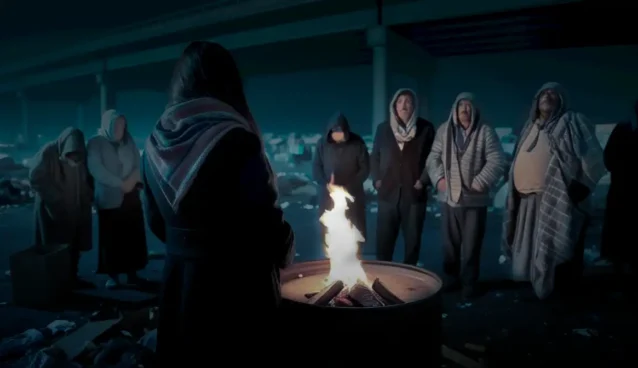ID-3

> Initializing system…
> Loading modules…
> Checking security protocols…
> System ready.
> grep “ctzn_a1245c972ba52b18aa3e85ed0d940004” -transcript -3 output
> Output:
/* Retrieved from Archive – Unredacted */
Outside the mist and dark wrapped around her. She stood for a moment, uncertain.
No phone. No implant. No home.
Her apartment door was a biometric vault. No keypad, no manual override. Even the building’s emergency access required verified ID. Her digital key had been tied to her phone, and now that was somewhere on the streets or hacked and resold by now. She couldn’t even buzz herself in. It was like her life had folded in on itself, encrypted. Leaving her locked out of her own reality.
She thought about sleeping on the doorstep, just curling up in the porch until morning. But the building security drones would sweep through by 2 a.m., and anything without a verified signal got tagged for removal. The drones didn’t ask questions. They didn’t check for context. Just redlight you and call enforcement.
She could go to her ex’s place.
She stood still at that thought, letting it flicker and die on its own.
No. Not him.
He wouldn’t help. He’d use it. Use her, this moment of weakness. He’d weaponize it, add it into the long, bitter story he told himself about why she was unfit, unstable, unworthy. The only reason he hadn’t taken full custody was because he didn’t really want the responsibility. He liked the freedom, the weekends to himself, the holidays away. But his new partner? She’d jump at the chance, even just to have a swipe at her. There’d be court papers before the weekend was over. A wry chuckle—then he’d leave her too.
No. Going there wasn’t help. It was opening up old wounds. It was surrender.
She looked wistfully in the direction of the nursery holding her daughter. Safe, but captive. “Sleep tight baby,” she whispered. Then turned and started walking. No destination yet, just away from the precinct, away from the nursery, away from the glass doors and scanners and the question: “Can you verify?”
The streets thinned out the further she went. Synthetic neon gave way to flickering LEDs. Glass towers to concrete slabs. The digital net was lighter here. Fewer drones, fewer readers and no shop front AIs whispering ads into your ear. Just cracked pavement, rusting fences, and the hum of the traffic on the overpass.
She knew where she was going before she admitted it.
The Underspill. The place beneath the overpasses, where the system’s blind spots collected people like dust in corners. The ones who had fallen out, lost IDs, lost housing and lost access. Old-timers who’d resisted the tech creep until it crushed them. Veterans. Addicts. Runaways. Off-gridders. Ghosts.
She used to walk past it, eyes straight ahead. It always felt like a different planet just metres below the clean loops of the city. But now it was her only option.
As she made her way down the slope off the main road, her boots slipping in the mud, she saw the first ember flicker ahead. A cluster of shapes hunched around a brazier. She slowed. They watched her. Quiet, unreadable.
At least there was fire.
They used old steel drums to burn bits of toxic insulation, windblown packaging, litter, even composite decking scraps. The air stank of melted plastic and burnt metal. But it was warm.
She nodded once. Not asking for permission. Just stating a fact: I’m here now.
One of them shifted over slightly. A silent offer. She stepped forward and held her hands out toward the flames. They smelled like death, but the heat soaked into her skin like an old friend.
No questions. No scanners. No digital trust score. Just bodies in the dark, surviving.
Sitting down, she stared into the flames; her face lined with dirt and grief and something harder beneath it all.
I’ll get her back, she thought. Though I don’t know how.
But tonight… tonight she was just one more ghost under the overpass. And for now, that would have to be enough.
The others, who hadn’t already drifted off to their makeshift dens, stiffened before she knew what the sound was. The hum of military tyres grew louder on the concrete slabs before the matt-black bulk of the Hummer became visible in the flickering firelight. It barely stopped before the armoured doors flew open and three enforcers – gangland hoods and debt collectors – jumped out and got to work.
Two waved red dots around, while the third wasted no time working through the ghosts and vets. Kicking open dens, and pulling them to their feet, he projected the red grid into the faces of each in turn, pushing them aside when it wasn’t finding anything he cared about.
It didn’t matter that everyone here was off-grid – gang bosses had their own system for keeping track of who they owned. Cracked Ret-Scan modules linked all the lowlifes to the gang’s darknet biometric database – with debt records that never seemed to get fully paid off.
One of the older vets, who’d been slowly edging away from the fire, moved suddenly. Limping as fast as he could up the slope to the main road, his broken leg brace clacked, as he desperately tried to put distance between him and the enforcers. It was futile. A crack punctuated the air as a red dot landed between his shoulders, collapsing him instantly into a writhing heap on the ground.
“You ain’t dead!” said the enforcer calmly, before kicking him in the ribs.
Using his boot, the enforcer pushed the prostrate vet over and onto his back, then took a reading.
“Vincent. You still owe the boss six big ones.”
“I’ve paid it already,” gasped the old man from the ground.
The enforcer rolled his eyes. “You ain’t,” he said finally. Then to his hoods, “take this one.”
She watched him continue scanning, as the red dots dragged the old timer to the wagon.
“Better have it by next week,” the enforcer said to a skinny woman beside her.
Then it was her turn. The almost imperceptible whine of the Ret-Scan, a brief flash that took her night vision, and he was on to the next.
Then the enforcer stopped.
“No debt. No nothing,” he said, staring distantly through his goggles.
He looked back and ordered her to stand.
Aching and tired she looked back up at him.
“Don’t make me say it twice.”
She carefully stood.
The enforcer got in her face, turning her chin with his forefinger and thumb to get a better look in the firelight. “You’ve not been here before,” he said. It wasn’t a question. He blipped her wrist. Nothing. He pursed his lips. “Are you even a person?”
The dots were returning from the wagon. “Take this one too,” the enforcer called, moving on to his next subject.
Strong arms closed around hers, holding her firmly and turning her involuntarily towards the waiting vehicle. She struggled hard and breaking free she started to run for it. Barely three paces into her escape and something slammed into her back knocking her to the ground.
“Bit slow weren’t ya,” yelled the enforcer at the red dots, and recovering composure from his solid front kick.
Struggling to get back up, she found herself pushed into the ground, the enforcer’s heavy boot grinding into the small of her back. She thrashed until she felt his other boot pressing her wrist painfully into the dirt, then gave it up.
“I don’t owe anything,” she gasped.
But the enforcer chuckled. “You do now,” he said, “no records means registration, and registration means registration fees.”
He stepped back and the red dots pulled her gasping to her feet, dragging her again towards the Hummer.
“You’re on our turf now lady,” the enforcer called after her, “it’s registration day!”
> done
>
